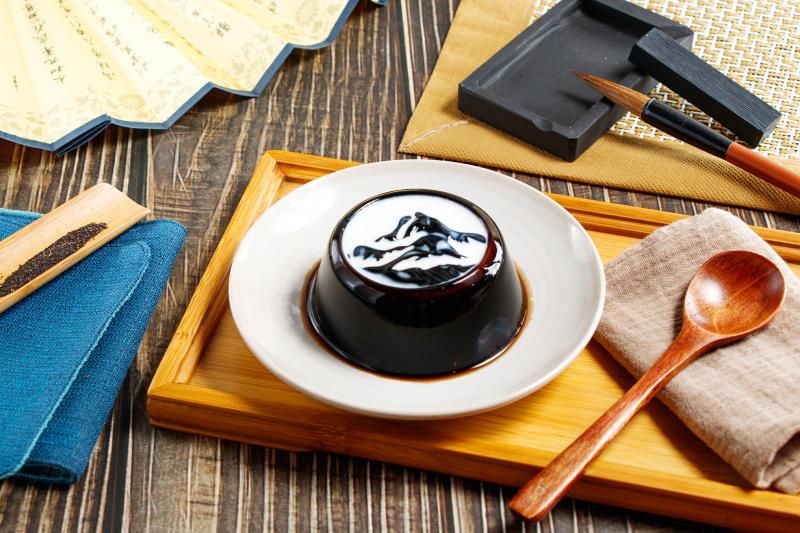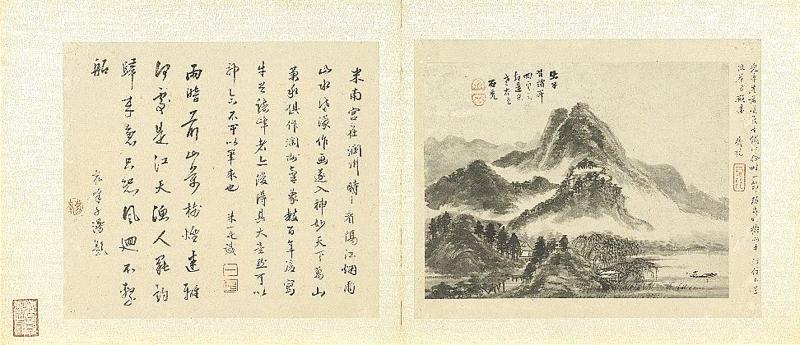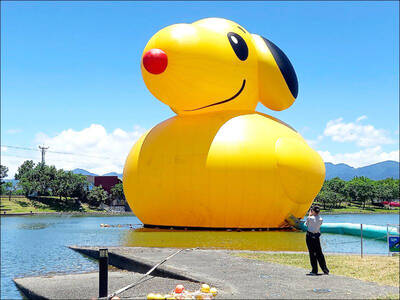A bowl of grass jelly, and the childhood memories associated with it, is perfect for taking the edge off of the sweltering summer heat. Grass jelly is made by boiling dried mesona plants and adding a gelling agent such as agar to the mesona tea.
This summer, the traditional treat has been given an artistic, dreamy new look with the National Palace Museum’s (NPM) “Ink-painting Jelly,” a collaboration with the Taiwanese company BlackBall Grass Jelly. When cream is poured over the jelly, a mountain design imprinted on the top of the black jelly emerges, forming a mountain scene with misty clouds swirling around the peaks, a classic theme for traditional East Asian ink paintings.
This is a winning design of the National Treasure Merchandise Design Competition, designed by Wang Bei-en and Liu Jia-xin, then students of National Taiwan University of Arts and National Taiwan University of Science and Technology, inspired by the famous black-and-white ink painting Dwelling in the Fuchun Mountains by Yuan Dynasty artist Huang Gongwang, and Cloud, Mountain, Smog and Rain by Shi Xi of the Qing Dynasty.

Photo courtesy of Taipei National Palace Museum 照片:台北國立故宮博物院提供
Over the past several years, many souvenirs launched by the NPM have become hits, such as paper adhesive tapes inscribed with zhen zhidao le (“Thou art understood!”, the signature note by an emperor on memos submitted by officials), and LINE stickers. Since 2010, the NPM has organized a National Treasure Merchandise Design Competition, in which the participants are invited to use the museum’s open data platform to develop creative products, so that NPM’s world-class collection of Chinese cultural relics can take on a new life of their own.
(Lin Lee-kai, Taipei Times)
炎炎夏日,來碗冰涼的仙草,阿嬤的古早味最是消暑。仙草茶是由曬乾的仙草熬煮而成,若再加上凝固劑(例如洋菜粉)冷卻,即成為仙草凍。

Photo courtesy of Taipei National Palace Museum 照片:台北國立故宮博物院提供
這傳統的平民小吃,今夏有了飄逸夢幻的姿態。「墨戲仙草」是由國立故宮博物院與台灣品牌「黑丸嫩仙草」聯名推出,黑色的仙草凍表面有描繪山麓的凹凸紋樣,淋上白色的奶油,便成了山間迷濛的雲霧,一幅饒富意境的水墨畫頓時浮現。
這是故宮國寶衍生商品設計競賽的獲獎作品,取材自清代石谿的《雲山煙雨》,以及元代黃公望的《富春山居》這兩幅水墨畫,由王蓓恩及劉嘉欣所設計,她們當時分別就讀於台北藝術大學及台灣科技大學。
故宮近年來所推出的文創商品屢掀熱潮,例如「朕知道了」紙膠帶、LINE貼圖等,更自二○一○年起,舉辦國寶衍生商品設計競賽,廣發英雄帖,參賽者可運用故宮Open Data資料開放平台,發想出各式國寶衍生商品,讓故宮世界級的中華文物收藏,與我們的生活更貼近。
(台北時報林俐凱)

A: The news says comic superstar Snoopy’s birthday is coming soon on Aug. 10. B: So he’s a Leo, and his birthday will fall on this Sunday. A: Cartoonist Charles Schulz created the comic strip Peanuts, featuring Snoopy, in 1950. And this year marks the character’s 75th anniversary. B: No wonder there are some big celebrations in Japan, Hong Kong and elsewhere. How about Taiwan? A: The “How Do You Do, Snoopy?” exhibition is taking place in Taipei. Let’s go to Shin Kong Mitsukoshi Department Store’s A11 branch to see the show. A: 新聞說,卡通巨星史努比的生日是8月10日耶。 B: 原來史努比是獅子座,本週日就是他的生日。 A: 漫畫家查爾斯舒茲1950年在《花生》漫畫創造了該角色,今年正好歡慶75週年! B:

When you think of the Netherlands, images of tulips, windmills, and iconic wooden shoes — known as “Dutch clogs” — may come to mind. These traditional shoes are rich in cultural significance. For centuries, Dutch clogs have been admired for their sturdy design and impressive craftsmanship, making them a fascinating symbol of Dutch heritage. Dutch clogs date back to the Middle Ages. During that time, farmers and laborers needed durable shoes to cope with the region’s damp and unpredictable climate and topography. Crafted from solid wood, such as willow or poplar, clogs offered outstanding protection. Their firm structure kept

Bilingual Story is a fictionalized account. 雙語故事部分內容純屬虛構。 “One DA-BEI... WU LONG... NAI?” Yujing smiled as the foreigner struggled to order. He looked like an embarrassed puppy. She repeated the order in Chinese, then English: “Oolong milk tea, large size. Half sweet, no ice?” she said gently. He beamed — the kind of full-face, sunshine smile that Latinos are famous for. “Yes! That! You are... lo maximo… the best!” After he left, Lily nudged her. “Nice save. You’re getting the hang of it.” Yujing had taken this summer job at the bubble tea shop to build confidence and get work

A: Apart from the “How Do You Do, Snoopy?” exhibition, the Penghu International Fireworks Festival displayed some Snoopy-themed balloon installation art. B: The Yilan International Children’s Folklore & Folkgame Festival also displayed a giant rubber “Snoopy Duck.” A: And Starbucks, Kura Sushi and 7-Eleven are all selling Snoopy-themed products. B: Starlux Airlines even launched new Snoopy-themed flights recently. Isn’t that cool? A: Taiwanese love Snoopy so much. Happy 75th birthday, Snoopy. A: 除了《How Do You Do, Snoopy?花生漫畫75週年特展》,澎湖海上花火節展出了史努比氣球裝置藝術。 B: 而宜蘭國際童玩藝術節,則展出了巨型「史努比鴨」。 A: 星巴克、藏壽司、7-Eleven也推出了史努比聯名商品。 B: 星宇航空今年更推出全新「Snoopy主題航班」,很酷吧? A: 台灣人好愛史努比啊,75歲生日快樂!